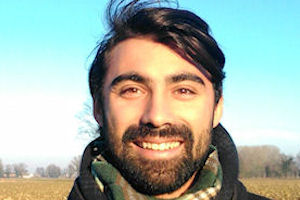Emergency migration response: the importance of a Master in Public Health
29 Apr 2015
Matteo Dembech, Technical Officer of the WHO Regional Office for Europe and part of the Public Health Aspects of Migration in Europe (PHAME) project team, shares his experience of studying for a Master in Public Health

Although he already held an MA in International Relations and an MSc in Global Studies, Matteo decided to complete his education with a Master in Public Health at the University.
The WHO PHAME project has been requested by WHO Member States to assist them during large influxes of migrants to better cope with emergency situations. Matteo’s work consists in working hand in hand with Governments, International Organizations and NGOs to find solutions aimed at protecting migrants’ health.
Matteo was lucky enough to contribute to the birth of the project in 2011 and to follow its development and growth over the past few years. Nowadays his main task is to support the project management and liaise with a wide range of stakeholders. More specifically he conducts country assessments in various Member States and design coordination mechanisms and policies to improve systemic response. In addition to the health component of his work he deals with partnership development and resource mobilization. Matteo believes that in his work is of paramount importance to “master the ‘political nature of health’ and its consequences.”
Outlining the advantages of the University of Manchester MPH programme for his work, Matteo said: “Migration and Health professionals have an important role in leading change and, doing so, are challenged by participating and leading consultative and democratic collaboration with other sectors. The only way to change the determinants of health outside the health sector is therefore to acquire scientific skills and being able to communicate, negotiate and mediate with a variety of stakeholders. I realized that in order to deliver my work effectively I need health and non-health skills, which might seem chaotic, but it does reflect the world we live in, that is the result of complex and interconnected variables.
“I chose a Master in Public Health as it represented a tremendous asset that, combined with my International Relations background, allows me to properly manage all the components of a project, the scientific and the political ones.
“Indeed in addition to the fundamentals scientific courses, I had the possibility to attend a course on Leadership and Public Health Strategy and one on Emergency Preparedness, Resilience and Response. I particularly appreciated these courses as they gave me the possibility to learn additional evidence and discuss with the professors ways to improve my every day work. I found it extremely useful and rewarding both personally and for my career development.”
To find out more about Matteo’s work, subscribe to the newsletter and apply for internships, click on the links below:
